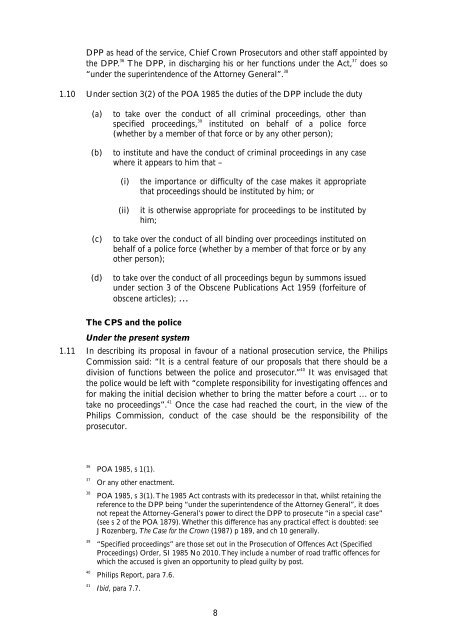cp149 Consents to Prosecution consultation - Law Commission
cp149 Consents to Prosecution consultation - Law Commission
cp149 Consents to Prosecution consultation - Law Commission
Create successful ePaper yourself
Turn your PDF publications into a flip-book with our unique Google optimized e-Paper software.
DPP as head of the service, Chief Crown Prosecu<strong>to</strong>rs and other staff appointed by<br />
the DPP. 36<br />
The DPP, in discharging his or her functions under the Act, 37<br />
does so<br />
“under the superintendence of the At<strong>to</strong>rney General”. 38<br />
1.10 Under section 3(2) of the POA 1985 the duties of the DPP include the duty<br />
(a) <strong>to</strong> take over the conduct of all criminal proceedings, other than<br />
specified proceedings, 39<br />
instituted on behalf of a police force<br />
(whether by a member of that force or by any other person);<br />
(b) <strong>to</strong> institute and have the conduct of criminal proceedings in any case<br />
where it appears <strong>to</strong> him that –<br />
(i) the importance or difficulty of the case makes it appropriate<br />
that proceedings should be instituted by him; or<br />
(ii) it is otherwise appropriate for proceedings <strong>to</strong> be instituted by<br />
him;<br />
(c) <strong>to</strong> take over the conduct of all binding over proceedings instituted on<br />
behalf of a police force (whether by a member of that force or by any<br />
other person);<br />
(d) <strong>to</strong> take over the conduct of all proceedings begun by summons issued<br />
under section 3 of the Obscene Publications Act 1959 (forfeiture of<br />
obscene articles); …<br />
The CPS and the police<br />
Under the present system<br />
1.11 In describing its proposal in favour of a national prosecution service, the Philips<br />
<strong>Commission</strong> said: “It is a central feature of our proposals that there should be a<br />
division of functions between the police and prosecu<strong>to</strong>r.” 40<br />
It was envisaged that<br />
the police would be left with “complete responsibility for investigating offences and<br />
for making the initial decision whether <strong>to</strong> bring the matter before a court … or <strong>to</strong><br />
take no proceedings”. 41<br />
Once the case had reached the court, in the view of the<br />
Philips <strong>Commission</strong>, conduct of the case should be the responsibility of the<br />
prosecu<strong>to</strong>r.<br />
36 POA 1985, s 1(1).<br />
37 Or any other enactment.<br />
38 POA 1985, s 3(1). The 1985 Act contrasts with its predecessor in that, whilst retaining the<br />
reference <strong>to</strong> the DPP being “under the superintendence of the At<strong>to</strong>rney General”, it does<br />
not repeat the At<strong>to</strong>rney-General’s power <strong>to</strong> direct the DPP <strong>to</strong> prosecute “in a special case”<br />
(see s 2 of the POA 1879). Whether this difference has any practical effect is doubted: see<br />
J Rozenberg, The Case for the Crown (1987) p 189, and ch 10 generally.<br />
39 “Specified proceedings” are those set out in the <strong>Prosecution</strong> of Offences Act (Specified<br />
Proceedings) Order, SI 1985 No 2010. They include a number of road traffic offences for<br />
which the accused is given an opportunity <strong>to</strong> plead guilty by post.<br />
40 Philips Report, para 7.6.<br />
41 Ibid, para 7.7.<br />
8
















